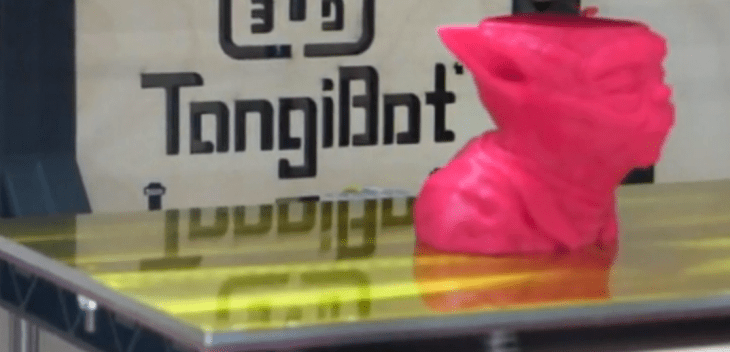In theory, this Kickstarter project aiming to sell a sub-$2,000 MakerBot clone shouldn’t be that much of a big deal. The MakerBot Replicator, one of the first (and best) home 3D printers in the world, is an open source product, and as such, anyone with a little wood, some soldering experience, and a dream should be able to build one – or a hundred and one. But in practice the Kickstarted project, called the TangiBot, is nearly an exact replica of the MakerBot.
What happens when an open source project begets its competitors and, more important, what does it mean for the open source hardware ethos in general if people flock to copies at the expense of the original?
The TangiBot, built by Matt Strong, is supposed to be “a clone of a popular open source 3D Printer” with “the same performance and features at a roughly 33% discount.” He aims to sell it at $1,299 for a dual extruder model (so you can print in two colors simultaneously). Compare this to $1,999 for a dual-extruder MakerBot. Strong will find his savings by manufacturing in bulk in China, something MakerBot has thus far avoided. “Just to be clear, there is nothing illegal, sneaky or underhanded going on here. Everything is legal and fair. This is simply the way open source designs work. Welcome to the world of open source,” wrote Strong.
His initial Kickstarter proposal was problematic, not because it cloned the MakerBot, but because it mentioned MakerBot at nearly every turn. It was also an open-ended business project rather than a one-off product. Those problems have since been fixed.
“I’m not out to shoot down MakerBot, I’m out to bring 3D printing to more people,” said Strong.
“This design is well known, already out there, and tested so the consumer is getting the best experience,” he said. “If I use an open source design and I improve it I’m required to share it back to the community and that’s what I’ll happily do.”
This reminds me of the days of cloned PCs. If you were shopping for a computer between, say, 1989 and 1993 you faced a plethora of choices made by hundreds of OEMs, all selling essentially the same beige box with the same parts. Only a few companies made it out of this clone deluge alive including IBM, Apple, Dell, HP, and Gateway. The market contracted quite quickly before the dot-com boom and the little mom and pop computer stores closed.
Bre Pettis at MakerBot declined to speak to the problem of cloning but if his funding and 7-day backlog are any indication, these smaller shops are definitely not hurting his business. In fact, I suspect a copy of the MakerBot – potentially without the same manufacturing care and QA – could only serve to sell more “official” parts and supplies.
In truth, there is no official MakerBot to steal. The MakerBot itself is a riff on the original RepRap replicator and one of the founders of MakerBot, Zach Smith, was one of the founders of the RepRap Research Foundation. Bre and Zach formed MakerBot when they asked each other if they wanted to quit their jobs to build robots. As a result, MakerBot began as a business venture and less an overt open source endeavor, although plans for the MakerBot are free to all comers. As the founders wrote in an early blog post, “The thing that makes the community so powerful is that when you hack it, it is anticipated that you will share your findings with the community so that everyone can benefit!”
Another open source hardware project, Arduino, produces and sells the most popular micro-controller systems in the world. Anyone with some soldering experience could feasibly make an Arduino board, but “clones” from Adafruit and from the Arduino store make it far easier for hobbyists to tinker without investing too much time or effort into gathering equipment and tools. Like Linux consultants, the software is free but the work is what costs.
“Being able to copy or ‘clone’ open source and open source hardware (OSHW) is not only OK, it’s celebrated,” said Phil Torrone, senior editor MAKE magazine and creative at Adafruit. “OSHW has a goal of not only having good designs shared, but the desire to add value to the world when it’s shared and improvements are made.”
The TangiBot and other printers like it improves the 3D ecosystem by driving down costs and increasing demand. Ideally these clones will be compatible with the current MakerBot platform and users will be able to swap parts and add-ons. Every clone sold builds good will and trust towards the still-nascent concept of 3D home printing. These clones contribute to an open market rather than a walled garden just as a few decades ago every PC clone sold built the backbone of today’s computing infrastructure. History, as they say, has the tendency to repeat.
Adafruit founder Limor Fried doesn’t find much value in arguing about who is right in the clone wars.
“Oh really? There’s debate about open source hardware? I’m going to keep shipping open source hardware while you all argue about it,” she said.
